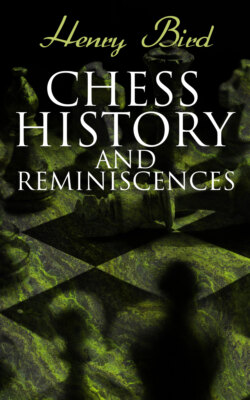Читать книгу Chess History and Reminiscences - Henry Bird - Страница 12
На сайте Литреса книга снята с продажи.
TRADITIONS AS TO THE ORIGIN
ОглавлениеThe traditions of chess are numerous and conflicting, Zakaria Yahya a writer of the tenth century in "The Delight of the Intelligent in Description of Chess" referring to stories extant and fables respecting its invention to that time remarks, "It is said to have been played by Aristotle, by Yafet Ibn Nuh (Japhet son of Noah) by Sam ben Nuh (Shem) by Solomon for the loss of his son, and even by Adam when he grieved for Abel.
Aben Ezra, the famous Rabbi, interpreter, and expounder of scripture, and who is said to have excelled in every branch of knowledge, attributed the invention of chess to Moses. His celebrated poem on chess, written about 1130 A.D., has been translated into nearly all languages of the civilized globe, into English by Dr. Thomas Hyde, Oxford, 1694.
The unknown Persian, author of the imperfect M.S. presented by Major Price the eminent Orientalist, to the Asiatic Society, and upon which N. Bland, Esq., mainly bases his admirable treatise on Persian Chess, 1850, says--"Hermes, a Grecian sage, invented chess, and that it was abridged and sent to Persia in the sixth century of our era."
The famous Shahnama, by Firdausi, called the Homer of Persia, and other Eastern manuscripts as well as the M.S. of the Asiatic Society, give less ancient traditions of the adaption of chess relating to the time of Alexander the Great and Indian Kings, Fur, Poris, and Kaid; in one of these the reward of a grain of corn doubled sixty-four times was stipulated for by the philosopher, and the seeming insignificance of the demand astonished and displeased the King, who wished to make a substantial recognition worthy of his own greatness and power, and it occasioned sneers and ridicule on the part of the King's treasurer and accountant at Sassa's supposed lack of wisdom and judgment. However, astonishment and chagrin succeeded before they were half way through their computation, for when the total was arrived at, it was found to exceed all the wealth of the world, and the King knew not which to admire most, the ingenuity of the game itself, or that of the minister's demand.
The earliest European work on chess is supposed to be that of Jacobus de Cessolus, a monk of Picardy, which appeared (it is said) in 1290 (scheilt swischen 1250-1275 Linde 1-10). His favourite names are Evil Merodach, King of Babylon and a philosopher named Xerxes, Massman, 1830, gives Ammelin, Amilin, Amilon and Selenus, Ibl, Xerxes whose Greek name was Philometer to whom 597 B.C. has been assigned.
Palamedes and Diomedes of Trojan celebrity, the Lydians of Herodotus, the Thoth of Plato, the Hermes of the Asiatic Society's philosopher; in fact nearly every one of the Gods who has in turn served as the Great Mythological Divinity has been credited with the discovery of chess.
NOTE. There are few parts of learning so involved in obscurity, as the history of Pagan idolatry. It may, perhaps, be some satisfaction to us to think that the ancients themselves knew even less of the matter than we do; but if so, it furnishes a strong argument for the necessity of being very cautious in drawing our conclusions. We believe it may safely be said, that there is not one among all the fabled deities of antiquity, whom (if the writers of antiquity may be trusted) it is not possible to identify with every other--Saturn, Jupiter, Mercury, Pan, Hercules, Priapus, Bacchus, Bel, Moloch, Chemosh, Taut, Thoth, Osiris, Buddha, Vishnou, Siva, all and each of these may be shown to be one and the same person. And whether we suppose this person to have been the Sun, or to have been Adam, or Seth, or Enoch, or Noah, or Shem, or Ham, or Japhet, the conclusion will be still the same, each of them, it may be shewn was worshipped as the Sun, and all of them, wherever their worship was established, were severally considered as the Great Mythological Divinity.
So far, It would not appear that there is any room for much difference of opinion, at least, not if ancient authorities may be depended on.
* * * * *
Dr. Salvic states on the strength of one of his authorities, and Alexandre apparently quite seriously has repeated the statement that the text in Samuel of Abner and Joab's twelve chosen champions "Let the young men now arise and play before us" may be applicable to chess, but the context of the chapter is opposed to any such conclusion. All the foregoing fabulous accounts may be at least declared "not proven" if not utterly unworthy even of the verdict pronounced in those two words. There are three more modern traditions or accounts, the first of which is referred to Alexander the Great's time 336 to 322 B.C., and the two others to about the time of Chosroes--900 years later. Forbes devotes thirteen pages to them and they are given with less detail by the Rev. R. Lambe in 1764 and N. Bland in 1850.
